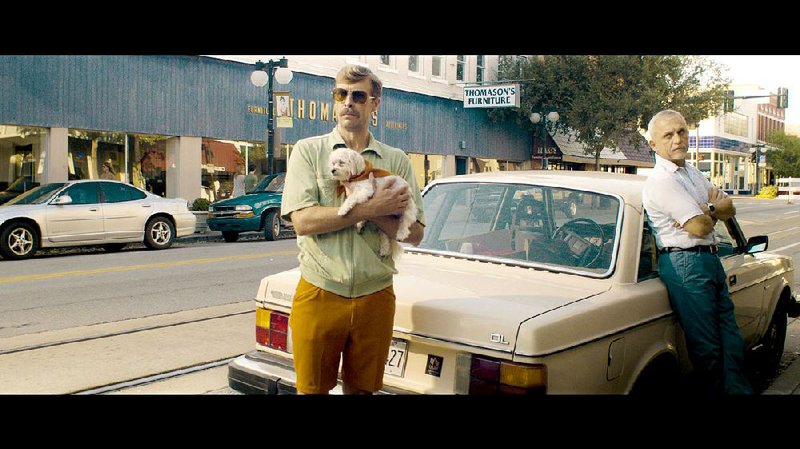A decade ago fledgling filmmaker Daniel Campbell made a 14-minute short called Antiquities. He submitted it to the Little Rock Film Festival and in 2010 it won the festival's inaugural Charles B. Pierce Award for the best film made in Arkansas.
At that festival he met Graham Gordy, the writer/actor/showrunner, and they became friends. And they decided to adapt and expand the short into a feature. In 2013, along with former Arkansas film commissioner Gary Newton, they formed the production company Mortuus Pater ("dead father") Pictures to make the film.
It took awhile, but in the fall of 2016 they shot that feature, which kept only the title and a few of the characters from the short, in Arkansas, largely in North Little Rock's Galaxy Furniture. Much of the local film community was involved in the production -- the film was shot by cinematographer Gabe Mayan, produced by Gordy, Campbell, Newton, Arkansas Cinema Society executive director Kathryn Tucker, Jayme Lemons and Angela Prosser, and features mainly Arkansas-based performers.
It played a number of film festivals in 2018, and was picked up for theatrical distribution by The Orchard. It's opening in Little Rock today.
Our critic Piers Marchant reviewed the film in advance of its screening during the Arkansas Cinema Society's Filmland event in August. In part, he wrote:
"The difficulty in basing a comedy on Southern eccentrics isn't finding the eccentric, it's finding a way to make it relatable.
"This is the conundrum faced by filmmaker Daniel Campbell in extending his 2009 short into a full-fledged, 90-minute feature. In so doing, he utilizes the single most common device when one needs to anchor a film in recognizable reality: the Straight Man. A dude whose very normalcy can be measured against the collection of bugaboos, crazies, and straight-up lunatics he encounters at nearly every turn.
"In coming to the town where his recently deceased father grew up, Walt (Andrew J. West), a young, good-looking man with equitable eyebrows, attempts to get to know his dad better, by essentially living in his shoes awhile -- quite literally, when he wears what he believes to be his pop's old boots.
"Staying with his terminally cheerful uncle (Jeff Bailey), aunt (Melanie Haynes), and cousin (Jason Thompson), who own a local grocery store, Walt gets a gig at the antiques pavilion his dad used to work in, where he meets a steady stream of further eccentrics manning their own booths, including the dour Blundale (Roger Scott, reprising his role from Campbell's short), who, among other things, makes tiny model re-creations of major Civil War battles but alters them so that the South always wins; Delaney (Michael Gladis), a slightly heavyset man who claims to be working out with his brother, a Navy SEAL; Jimmy Lee (Graham Gordy), a soft-spoken man whose booth is an exact re-enactment of his childhood living room during Christmastime; the neurotic Delores Jr. (Michaela Watkins), who debates about getting a nose job or breast equalizing surgeries; the general manager Dewey Ray (Troy Hogan), married to much older "Blundale's Mama" though once a classmate of the embittered Blundale himself; and the fetching Ellie (Ashley Greene), a curious woman also grieving after the recent loss of her beloved brother.
"Being a romantic comedy, you can certainly fill in the plot mechanics: Walt ingratiates himself with this bevy of loons because of his very normalcy, while falling for Ellie and finding out about his father in the process. As far as storylines go, it's pretty much standard fare, where Campbell makes his bones is in the specific details of his quirky characters, and here it becomes clear that the man has spent considerable time in the presence of such curious specimens.
"Walt, who spends the first half of the movie in full reaction mode -- raising an eyebrow, or desperately scheming escape routes away from whatever mad hatter has most recently engaged him -- gradually becomes more in focus as the film progresses. What starts out as a Bob Newhart-esque comedy of contrasts between an eternally normal figure amid a veritable thicket of crazed eccentrics -- Joe vs. the Weirdos -- eventually spreads beyond surface types and at least hints at deeper emotions underneath the bluster and oddball outlooks.
"Dewey Ray, meanwhile, tells Jimmy Lee he can no longer maintain a booth in which he refuses to sell even the smallest trinket to a customer, an edict that renders what is clearly a crushing blow to the fragile man; and, eventually, Walt's staid composure begins to crack as he learns more about his father, who had wrestled with a drinking problem later in his life. This fact, he confides to his shrink (Mary Steenburgen), whose "therapy parrot" constantly interrupts her sessions with declarations of harsh truth ("dead father" it chants at Walt before he's finally had enough).
"It is in these moments, with the characters' defense screens down, that they become less like amusing caricatures and more relatable, without the need for Walt and his eyebrows as a tour guide. This adds a necessary richness of flavor, making it more satisfying than just watching a bunch of offbeat types present their peculiar wares for the camera. If the film follows its stock formula a bit too closely, this loosening of the restraints on the characters gives it enough of an emotional charge to carry it to the finish line."
MovieStyle on 01/25/2019
